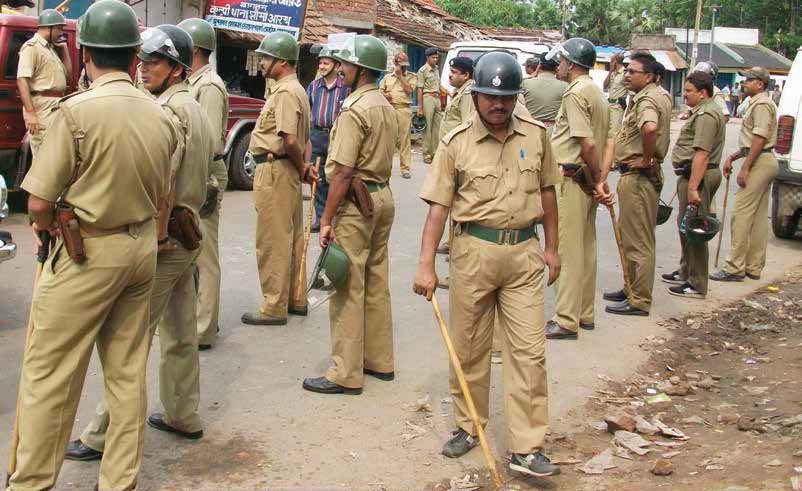This article is written by Deepali Bhanot from Amity University, Haryana, an intern at Lawsikho.
Table of Contents
Introduction
Confession is an incriminatory statement made by the accused which indubitably point towards his guilt. It is an admission of guilt apropos the crime with which the accused is charged. The etymological meaning of the word ‘confession’ conveys the meaning of ‘completeness’ for this comes from a Latin word Confiteri… (Con signifies completeness and fateri signifies to speak), so a confession must be unreserved and total avowal by the accused person of his guilt. For a statement to be confession an inference must be drawn that the accused is guilty of that offence, otherwise any statement even of gravely incriminating nature would not amount to confession. Any statement made by the accused with respect to the offence of which he is charged will amount to confession when conviction can be based solely on the statement and no supplementary evidence would be required. The confession, if made voluntarily is a substantive piece of evidence, the probative value of which is very high.
Forms of confession
A confession may be made in any form. Confession is Judicial when the accused admits his guilt directly before the court of law on the other hand Extra-judicial confession is when the accused admits his guilt before any person outside court. The person may be a police officer or any other private person. Judicial Confession is a good piece of evidence however, Extra-Judicial confession is a weak one and must be observed with circumspection.
Confession may be oral or written. It is not necessary that confession must be communicated to some other person. Statements made to oneself, if overheard by another, can serve as evidence. Therefore, confession may take place even when one is talking to oneself.
After observing these points an interesting question arises whether incriminating statements made during sleep are admissible in evidence. These statements are not admissible because of a very natural reason for suspension of mental faculties during sleep.
Evidentiary value of confession
The confession, if voluntary and credible, is considered to be the best and most conclusive piece of evidence as it is presumed that ‘no person will make a false statement incriminating him’. Conviction can be based solely on confession if the court is satisfied with voluntariness and trustworthiness of confession. The level of satisfaction of court must be of high degree. The court must satisfy itself as to willingness on the part of accused making confession because confession may not always be voluntary and true. Sometimes it may be because of mental aberration, vanity, to escape physical and moral torture etc. which reduces its probative value. Therefore, a legal duty has been cast upon the court to ascertain whether confession made by the accused is voluntary or not.
In Sahoo v State of Uttar Pradesh, 1965, it was held that in case of confessions courts must apply a double test;
- Whether the confession was perfectly voluntary.
- If so, whether it is true and trustworthy.
If a confessional statement satisfies both above mentioned conditions it may be relied upon.
Though, there is no rule of law which says that conviction can’t be based upon uncorroborated confession however, as a matter of prudence it is usually considered safe to look at confession in the light of all of the evidence on record. In Muthuswamy v State, 1951, the court observed that confession shouldn’t be accepted merely because it contains a wealth of details. Unless the main features of the story are shown to be true, it would not be safe, as a matter of prudence, to base a conviction on confession by itself.
Admissibility of confession
Admissibility is not based on logic but on law and strict rules. All admissible evidence is relevant but all relevant evidence is not admissible. The confession as a piece of evidence appears to be very relevant because it is inexplicable that why any person will deliver a statement against his own interests however, it’s not admissible in all cases.
There are several factors by which admissibility of confession may be determined. These include its voluntary and truthful nature, veracity, intention to confess etc. however the most important factor is to ‘whom the confession is made’, which can largely impact its admissibility. Confession made to a police officer is absolutely inadmissible in accordance with provisions laid down in law of evidence. However, the same confession made to a competent Magistrate becomes admissible.
Confession to Police Officer (Section 25)
Section 25 of the Indian Evidence Act, 1872 provides for inadmissibility of confession made to a police officer. It says that ‘no confession made to a police officer can be proved as against the accused’. Section 25 imposes a bar on the admissibility of confession made to a police officer and absolutely excludes it from evidence against the accused, under whatsoever circumstances. Whether such a person is in police custody or not, whether the statement is made during investigation or not, is irrelevant.
In Queen Empress v Babu Lal, 1898 it was observed that the objective underlying this rule is to prevent the practices of torture and oppression by police officers for the purpose of extorting confessions and securing convictions. If confession to a police officer is made admissible, the police officers would go to the heights of torturing the accused and compel him to make an involuntary statement merely for gaining credit, which would result in grave injustice.
The Rationale behind this principle emanates from decided cases;
- The privilege against self-incrimination lies in the root of this principle.
- A partisan and trustworthy attitude cannot be expected from police offices.
- To preclude the abuse of authority by constabulary as they can achieve something behind the door which our law forbids. Our law focuses on voluntariness of confession which gets hampered because of the operation of pressure and fear by police on the mind of the accused which deprives him of his free will.
Making a confession is in fact a logically relevant fact but the same becomes inadmissible when it’s made to a police officer to prevent the practices of oppression and to save the fundamental rights of the citizens from being eroded. The cardinal principle is that the confession must always be made out of repentance and contrition, completely uninfluenced by external factors which may be employed by police. Actions of police officers are approached with distrust and therefore, it becomes difficult to place reliance on the same. It’s difficult to believe that the accused made the confession out of his free will and conscience when the same was made to the police officer.

Confession in Police Custody (Section 26)
‘No confession made by any person whilst he is in police custody unless it is made in the immediate presence of a Magistrate, shall be proved as against such person’.
Section 26 of the Indian Evidence Act, 1872 comes into play when a person in police custody is conversing with any person other than the police officer and confesses his guilt. The underlying principle of this provision is the same that police may torture and compel the person to confess involuntarily and the resulting confession would suffer with infirmities. The expression ‘police custody’ doesn’t mean formal custody but includes any state of affair where a police officer may exercise his authority over the accused and may be at home, open place etc.
Immediate presence of Magistrate; the confession made in police custody but in immediate presence of Magistrate would be deemed to be admissible as presence of a Magistrate may rule out the possibility of any pressure or torture by police.
Therefore, both section 25 and 26 render the confession made to police officers or in police custody inadmissible. They act as a safeguard and ensure that confession which can incarcerate the accused must be made voluntarily. However, confession made to a Magistrate serves as a good piece of evidence provided that it has been recorded after ensuring that the accused intended to make it freely.
Admissibility of confessions made to a Magistrate
Willingness on the part of the accused to confess can’t be ensured when confession is made to a police officer; however, it can be in the case of a Magistrate.
Section 164 CrPC lays down a special procedure for recording of confessions and statements. It provides for recording of confessions by competent magistrates after ensuring that the confession is voluntary and no amount of inducement, threat or fear operates on the mind of the accused. The confession made to a Magistrate is considered to be a substantive piece of evidence as even slight possibilities of confession suffering with infirmities are expunged.
Under section 164 the Judicial Magistrate has been empowered to record statements as well as confessions. It becomes pertinent to note here that all statements are not confessions but all confessions are statements. Only those statements from which guilt can be deduced shall be deemed to be confession. . A declaration is not a confession if it is not made with an animus confitendi (i.e. intention to confess).
The mode of recording confession is more elaborate than that of mere statement as it becomes imperative to ensure that confession is being made voluntarily.
Power of Judicial Magistrate to record confessions and statements (Section 164)
The essential ingredients of sec 164 are:
Recording of confession/statement by Magistrate [Section 164(1)]
A confession/ statement must only be recorded by Metropolitan/Judicial Magistrate, whether or not he has jurisdiction in the case. It can also be recorded by audio-video electronic means in the presence of the accused’s advocate. However, any police officer on whom the powers of Magistrate have been conferred by any law would still be barred from recording by virtue of provisions laid down in Indian Evidence Act.
During the course of investigation
The abovementioned provision also provides that Confession/ Statements can be recorded under this section only during the course of investigation or at any time before the commencement of inquiry or trial. The Magistrate may record under section 164 even after submission of charge-sheet provided magisterial inquiry or trial doesn’t commence. Similarly, if the confession is recorded by a magistrate where no investigation has begun, section 164 will not apply.
In the case of Hem Raj v State of Ajmer, 1954, it was held that the confession recorded after the commencement of inquiry or trial can still be used in evidence but section 164 will not relate.
Warning [Section 164(2)]
Before recording any such confession a legal duty has been cast upon the Magistrate to apprise the accused that:
- He is not bound to make the confession,
- If he does it can be used as evidence against him.
These provisions are salutary and are not mere formalities and therefore, strict compliance must be ensured. The Magistrate must also disclose his identity to the accused to assure him that he is free from the influence of police. If the magistrate fails to deliver warning to the accused or to disclose his identity, it can vitiate the confession and render it inadmissible.
In Mahabir Singh v State of Haryana, 2001, the court observed that where the Magistrate fails to inform the accused that he was not bound to make the confession, such confession shall not be considered as evidence against the accused.
Refusal to record
The abovementioned provision also provides that the Magistrate may refuse to record the confession if he is not satisfied with its voluntary nature. If on questioning the accused, the Magistrate has a reason to believe that confession is involuntary he should abstain from recording it. In Chandran v State, 1978, it was held that under section 164, it is sine qua non that the magistrate must have reason to believe that the confession is voluntary. The expression ‘has a reason to believe’ imports a high degree of expectation which is free from doubt.
To ensure that confession is made voluntarily, the following conditions are usually followed;
- After giving warning the accused must be provided with adequate time to think and reflect, so that he can ensure that he is completely free from police influence.
- The accused person must also be assured protection from apprehending torture by police in case he refuses to make a statement.
- The accused must also be asked about his reason for making an incriminatory statement.
- The Magistrate must question the accused to ascertain his willingness to confess.
- To adjudge voluntariness, Magistrate must take note of two basic factors.
- His existing mental condition, whether the accused is mentally deranged or not in a fit condition.
- The real motive which exhorted him to confess.
- The Magistrate must explain to the accused about his fundamental right under Article 22(1) and under section 303 his right to consult a lawyer.

Bar against police pressure, Section 164(3)
It provides that at any time before the recording of confession if the accused says he is not willing to make a confession, the magistrate shall not authorize his detention in police custody. This is to prevent accused from being subjected to torture by police in case he refuses to make confession and to preclude the practice of fabricating confessions.
Manner of recording confessions, signature
The confession shall be recorded in manner provided under section 281 and shall be signed by the person making it. The whole of the confession must be shown and read over to the accused so that he may rectify or elaborate some answers.
In Dhananjaya Reddy v State of Karnataka, 2001, It was held that the words, ‘shall be signed’, are mandatory and the Magistrate recording the confession has no discretion. However, a mere failure to get the signature of the person making the confession may not be very material if making such a statement is not disputed by the accused. But in cases where making of the statement is in controversy, omission to get signature can be fatal.
The Magistrate shall also append a memorandum at the foot of such record as a certificate of its voluntariness. The confession without a memorandum is bad in law and cannot be admitted in evidence.
Recording statement other than confession
Any statement other than the confession made under this Section can be recorded in the manner in which evidence is generally recorded. Administration of oath is barred in recording confessional statements.
Transfer of confession to Magistrate of jurisdiction, Section 164(6)
Provides that the magistrate recording confession or statement under this section shall forward it to the Magistrate by whom the case is to be inquired and tried.
Therefore, a magistrate is empowered to record a confession after ensuring its voluntariness and trustworthiness. Giving warning to the accused is imperative to make sure that he knows the consequences of his action. In case of any doubt as to the credibility of confession the Magistrate may even refuse to record, which ensures that any culpable information must not be used against the accused against his will. To add more elements of authenticity, the signature of the accused and memorandum must be appended.
The reason why confession made to a Magistrate is admissible is because all possibilities of involuntary confession due to external factors like fear, oppression are eliminated with steps taken by Magistrate u/s 164 which makes it a reliable piece of evidence and increases its probative value. All infirmities with which the confession suffered in case of police officer are cured when it is made to a Magistrate in strict compliance of provisions of this section.
Legal consequences of non-compliance
The special procedure under section 164 is mandatory. The provisions contained in section 164, if administered in proper spirit are most salutary. The confession recorded under section 164 can be used as substantive evidence, however; non-compliance with this section would render the confession inadmissible in evidence. It is to be noted that mere procedural and technical irregularities would not vitiate the confession if there is ‘substantive’ compliance with provisions of Section 164.
Conclusion
Confession as substantive evidence has high probative value and is appreciated the most by court of law. Conviction can be based solely on the basis of confession if its voluntariness and reliability is undoubted. Confession carries a vehement force in itself and can drive the whole proceeding in a particular direction therefore; the seriousness attached with confession must not be undermined. It must be observed with a lot of caution and circumspection so as to expunge even slight chances of error. The confession must always be an outcome of conscience burdened with guilt and contrition. The underlying reason for making the confession must always be colored with repentance and remorse and not with oppression or influence. Therefore, it becomes indispensable to ensure the truthfulness and voluntariness of confession. Operation of external influences of threat, fear adversely affects the quality of confession made to police whereas all necessary steps are taken to ensure the removal of these factors when confession is made to a magistrate. The cardinal rule is to ensure the credibility and reliability of this piece of evidence by courts. Therefore a person must always be protected from delivering a self- incriminatory statement unless propelled by his conscience to do so.
LawSikho has created a telegram group for exchanging legal knowledge, referrals and various opportunities. You can click on this link and join:
 Serato DJ Crack 2025Serato DJ PRO Crack
Serato DJ Crack 2025Serato DJ PRO Crack










 Allow notifications
Allow notifications


